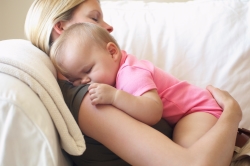By Lynn Lee
 Bringing your newborn baby home can be a very exciting, joyous time. It may also be overwhelming and stressful. Pregnancy and childbirth are emotional journeys, and it’s entirely normal to occasionally feel a little down for the first few weeks after your baby is born (“The Baby Blues”). But if these feelings continue beyond those first few weeks, you may be suffering from a more serious condition known as postpartum depression.
Bringing your newborn baby home can be a very exciting, joyous time. It may also be overwhelming and stressful. Pregnancy and childbirth are emotional journeys, and it’s entirely normal to occasionally feel a little down for the first few weeks after your baby is born (“The Baby Blues”). But if these feelings continue beyond those first few weeks, you may be suffering from a more serious condition known as postpartum depression.
Postpartum depression is not all that uncommon. It is estimated that one in eight women will be affected by and experience postpartum depression symptoms after giving birth, symptoms that, for some, will require outside help and treatment. There are also women who may begin experiencing these symptoms during their pregnancy.
Knowing your body, as well as the signs of what could be something more than just depression or anxiety, is very important. Some postpartum depression symptoms may include:
• Loss of interest in social interactions and enjoyment of social activities
• Mood swings ranging from sadness and anxiety to extreme guilt
• Little to no energy
• Feelings of exhaustion and body fatigue
• Lack of interest in your baby
• Feelings of worthlessness, thinking that your baby would be better off without you
• Feelings of hopelessness, thinking that you are not going to get better
• Lack of concentration, inability to make decisions
• Suicidal thoughts
 Postpartum depression is not something that should cause embarrassment. It’s also not something that should be ignored. Support groups, psychotherapy, medication and modifications to your exercise routine and diet can help you feel better.
Postpartum depression is not something that should cause embarrassment. It’s also not something that should be ignored. Support groups, psychotherapy, medication and modifications to your exercise routine and diet can help you feel better.
Although there is no way to know if you will develop postpartum depression, there are some things you can do help alleviate the symptoms of postpartum depression:
• Ask for help. Allow friends and family members to offer you a helping hand, whether that be through cooking, cleaning or just being around to give you a chance to recharge.
• Get moving! Stay active, even if it’s just in short bursts. These small increases in your activity level can help keep your mood and thoughts positive. When time allows, try to do some exercise. You’ll likely feel better and it will also relieve you of some of those extra post-pregnancy pounds.
• Eat your vegetables and fruits. Choose healthy, nutrient-rich food whenever possible. Eating healthier foods will help you feel better and boost energy levels at various points throughout the day. Avoid alcohol and caffeine as much as possible.
• Communicate often with your physician. Make sure you are going to all after-birth follow-up appointments, but also call your physician as soon as any concerns, issues or questions arise.
• Seek community support. Consider joining a support group for new moms. Your physician can likely recommend options in your area.
If you feel that you may be experiencing postpartum depression symptoms, it’s important to act fast. Contact your physician for assistance. If you need immediate emergency care, do not hesitate to contact 911. With the appropriate help and guidance, you can start to feel better and get on the road to enjoying those unforgettable and irreplaceable moments of new parenthood.
– This post was submitted by Lynn L. This information was provided by NorthShore University HealthSystem, a comprehensive healthcare system serving the Chicago region. Visit NorthShore University HealthSystem online to learn more about treatment for postpartum depression symptoms.
